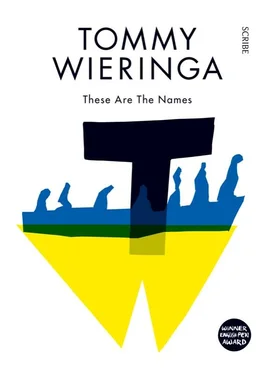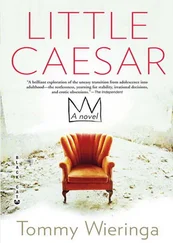He slept very little. The hard, cold ground hurt his bones. He tried to think about the house where he would live when this was all over, the big house for his whole family — if only he could remember the faces of his father, his mother, and his brother! They kept escaping him; there was only the flash of an eye, a laugh, his mother’s skirts. And the vultures riding the thermals over the valley, he saw, but not the people themselves.
Where are you? he shouted in silence. Come out!
But he had been away from home too long already; his new life had buried the old one. Only his heart wept. Real tears would have frozen right away and rolled from his cheeks like pearls.
One day, he promised himself, once he was safe, he would dig up his old life; it was waiting for him beneath the sand — immovable, unchanged.
Stiff as string puppets, they stumbled through the day. They heard geese in the sky above them, but didn’t see them. A bit of snow fell that afternoon. For a few hours, tiny flakes whirled down from heaven. They were still following the frozen tyre tracks, their lifeline. They had to go somewhere, because they came from somewhere.
That was how they crawled forth across the frozen planet, an icy stone. The sky grew more and more compact. Snow fell from it uninterruptedly now, grey as ash. They peered into the lightless day through a crack in the cloths protecting their faces. The snow whirled before their eyes. It had been the worst mistake of their lives, to move on again. The head had stopped bringing them luck; his candle had guttered.
But there was no going back. The village was already too far away; they could move only ahead.
They rested for a few hours, mere snowy bumps on the plain. Their account of time had been reduced to days, hours.
Long before the new day began, they were on their feet again. They ploughed through the heavy snow. Still following the track, the poacher cleared the way before them. When they stopped for a moment, the silence pressed against their ears. The snow had covered the world and its sounds.
Before their eyes, the picture shattered; they could see for only a few metres.
Vitaly sank to his knees in the snow and stayed there, unable to take another step. He would have frozen in that position had the poacher not gone back to pummel him to his feet and drive him out ahead, cursing. Behind them came the woman and the man from Ashkhabad. The boy brought up the rear.
Hour after hour passed. His eyes averted, he followed the footsteps in the snow. That was why he was the last to see it: the light in the distance, light that was unsteady and casting about in the darkness and the driving snow.
A car.
First, a car. Then, for a long time, nothing. Then the city.
CHAPTER THIRTY-NINE.Little Moses
The soil had come unfrozen, the cold afternoon sun shining through the light-green leaves of the poplars. In the distance you could hear the deep, continuous barking of dogs. The pope cleared his throat. He had buried a nameless girl. The scant information he’d had was given him by the other man at the graveside — the police commissioner. In a level, earnest tone, he had told the pope about the anonymous girl. The commissioner had a boy with him. His son? Why would he bring his son to a sad occasion like this?
The weak breeze rolling across the graveyard held traces of winter and the cheerful warmth of spring. It was full of old scents that reminded your old heart of desires from long ago — vague but oh-so-strong. It led young people into the worst of blunders and the greatest of happiness, so you could imagine how the girl had left her parents’ home on a day like this to go her way, heading for adventure. Don’t! Beg shouted straight through the years, Stay home, please, the world is a dangerous place! But she didn’t hear him. Her heart pounding in excitement, she took up her position along the road, and it wasn’t long before the first car stopped …
They parted at the end of the lane, close to the Polish graves. The pope watched them go, the stocky policeman and the dirt-poor boy with eyes like a doe’s. Then he returned to the chapel, his black skirts flapping around his body.
Beg left the city behind, and they drove through open countryside, past dilapidated sheds amid tall bushes and weeds — the tail ends of town. With his window open a crack, the wind seized at his doleful thoughts about the girl and blew them away. The boy toyed with the knobs on the radio, alighting on snatches of voices, metallic jangling, and a music station from beyond the border. The boy liked contraptions, as long as they had buttons. The noise didn’t seem to bother him. At Beg’s house, he hadn’t been able to keep his hands off the TV and sound equipment. Now, Beg reached out resolutely and turned off the radio, so that they heard only the toiling of the engine and the hiss of wind through the window.
‘Don’t you like music?’ the boy asked after a while.
‘Yes, but not that loudly.’
‘So you could have turned it down, couldn’t you?’
Beg didn’t reply; instead, through the windshield, he looked at the hills in the distance. The road climbed gently.
‘I want to show you something,’ he said. ‘It’s not far now.’
‘Did you bring any bread along?’
That was the other thing: the boy was always hungry. He seemed to have a hollow leg. Beg looked over. ‘We’ll buy something on the way back.’
The boy opened the glove compartment. He found handcuffs and sunglasses, a pair of binoculars, a citation book, pens, and sheets of paper — but nothing that could still his hunger.
‘Why do you have such an old car, anyway?’ he asked. ‘You’re the boss of the policemen, right?’
Beg glanced over. ‘A long story,’ he said.
They drove into the hills. Beg avoided the potholes. At a turn-off, broken graders stood rusting in the open air.
Beg crossed the road and drove up a dirt path beneath the trees. They went downhill again, the car jolting over stones. The woods thinned out before Beg parked the car on a little promontory. They climbed out.
It was quiet, and cold air streamed from the woods. Sand and stones crunched beneath the soles of their shoes as they walked to the edge of the bluff. The range of low hills was nothing but a blip in the flats; at his feet, the vast landscape began anew. The steppe in front of them stretched as far as the eye could see. The dead, yellow grass was making way for new shoots, so that the landscape was shot through with a green haze. The wind swept it, and the grass billowed. Rays of sunlight fell between the clouds. The horizon was hazy, uncertain.
The boy looked up at him. Where were they? What were they doing here?
Beg pointed at a line in the distance. ‘The border,’ he said.
Neither of them spoke.
Far below them, the border meandered. Once it had been heavily guarded on this side. In those days, refugees were shot down by snipers. Now it was the other side that had thrown up new defences.
Beg took the binoculars out of the car and handed them to the boy. He looked through the lenses, and then held them a little way from his eyes.
‘Here,’ Beg said, ‘you have to turn this until the focus is right for your eyes — no, hold them up to your eyes … and now turn it. Until everything gets clear.’
‘Is that a fence?’ the boy asked after a while.
‘This section of it is a fence. Further up, north of here, they work with infra-red, mobile teams, even satellites. They have night glasses. It’s watertight.’
The boy snorted. ‘Not for me.’
‘Yes, for you, too.’
‘I can make myself real small …’
‘But not invisible.’
Читать дальше











